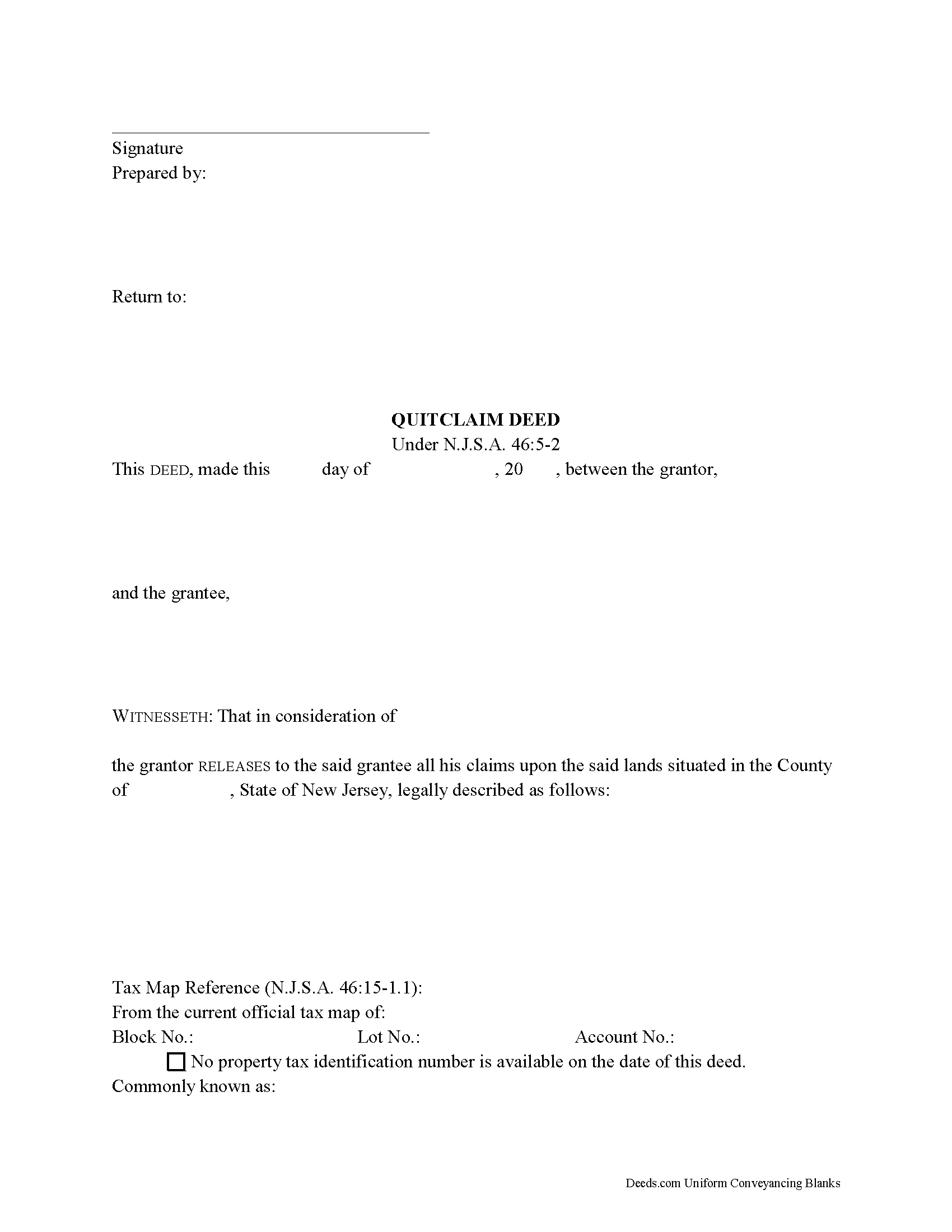New Jersey Quitclaim Deed
County Specific Legal Forms Validated as Recently as August 28, 2025

About the New Jersey Quitclaim Deed

How to Use This Form
- Select your county from the list on the left
- Download the county-specific form
- Fill in the required information
- Have the document notarized if required
- Record with your county recorder's office
What Others Like You Are Saying
“Documents are ok but I needed to reword some of the verbiage and it cannot be edited without paying …”
— Nellouise S.“Thank you it was quick and easy”
— Peggy R.“Site is SO easy to use. Thank you for such a valuable resource.”
— Stephanie B.“Your web site is very user friendly and easy to navigate I was very pleased with the experience”
— michael b.“Your website is very easy to use. No problem downloading the forms.”
— James B.
In New Jersey, real property can be transferred from one party to another by executing a quitclaim deed.
Quitclaim deeds are identifiable by the word "release" in the granting clause, and they function to terminate whatever interest the grantor holds at the time of the transfer (N.J.S.A. 46:5-2). In New Jersey, conveyances in which the grantor remises, releases, or quitclaims interest in real property to the grantee without reservations "pass all the estate which the grantor could lawfully convey by deed of bargain and sale" (N.J.S.A. 46:5-3). This means that a quitclaim deed transfers the same quality of title as a bargain and sale deed. Quitclaim deeds differ from bargain and sale deeds, however, in that they do not include a promise from the grantor that he or she has not encumbered the property (N.J.S.A. 46:4-6).
A lawful quitclaim deed includes the grantor's full name, mailing address, and marital status, and the grantee's full name, mailing address, marital status, and vesting. Vesting describes how the grantee holds title to the property. Generally, real property is owned in either sole ownership or in co-ownership.
For New Jersey residential property, the primary methods for holding title are tenancy in common, joint tenancy, and tenancy by entirety. A conveyance to two or more unmarried persons is presumed to create a tenancy in common, unless otherwise stated. A conveyance to a married couple creates a tenancy by entirety, unless otherwise stated (N.J.S.A. 46:3-17, 46:3-17.3).
As with any conveyance of realty, a quitclaim deed requires a complete legal description of the parcel. Recite the prior deed reference to maintain a clear chain of title, and detail any restrictions associated with the property. The deed should meet all state and local standards of form and content for recorded documents.
Sign the deed in the presence of a notary public or other authorized official. For a valid transfer, record the deed at the recording office in the county where the property is located. Contact the same office to confirm accepted forms of payment.
Deeds transferring new construction as the term is defined in N.J.S.A. 46:15-5(1)(g) should contain the words "NEW CONSTRUCTION" in all caps on the first page (N.J.S.A. 46:15-6(2)(c)).
If the conveyance is exempt from transfer taxes, explain why on the face of the deed. See N.J.S.A. 46:15-10 for transfer tax exemptions. Include a completed Affidavit of Consideration with deeds claiming exemption or partial exemption.
Record a Gross Income Tax Form (GIT/REP) with a deed when transferring real property in New Jersey. Ask the local assessor or recording office for help in choosing the correct version of the GIT/REP.
This article is provided for informational purposes only and is not a substitute for legal advice. Contact an attorney with questions about using quitclaim deeds, or for any other issues related to transfers of real property in New Jersey.
(New Jersey QD Package includes form, guidelines, and completed example)
Important: County-Specific Forms
Our quitclaim deed forms are specifically formatted for each county in New Jersey.
After selecting your county, you'll receive forms that meet all local recording requirements, ensuring your documents will be accepted without delays or rejection fees.
How to Use This Form
- Select your county from the list above
- Download the county-specific form
- Fill in the required information
- Have the document notarized if required
- Record with your county recorder's office
What Others Like You Are Saying
“Documents are ok but I needed to reword some of the verbiage and it cannot be edited without paying …”
— Nellouise S.“Thank you it was quick and easy”
— Peggy R.“Site is SO easy to use. Thank you for such a valuable resource.”
— Stephanie B.“Your web site is very user friendly and easy to navigate I was very pleased with the experience”
— michael b.“Your website is very easy to use. No problem downloading the forms.”
— James B.Common Uses for Quitclaim Deed
- Transfer property between family members
- Add or remove names from property titles
- Transfer property into or out of trusts
- Correct errors in previously recorded deeds
- Gift property to others